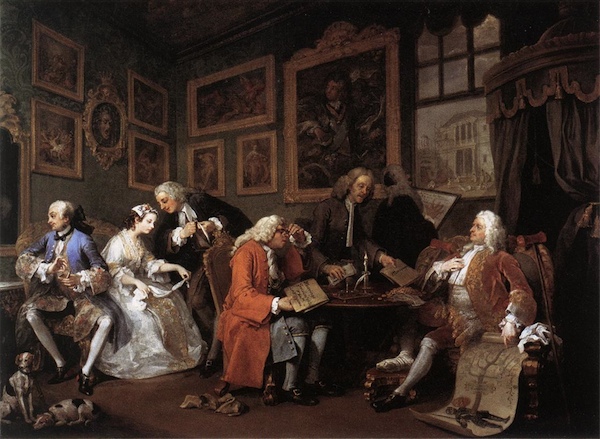
Den Pakt zu wechselseitigem Gebrauch
Von den Vermögen und Geschlechtsorganen
Den der die Ehe nennt, nun einzumahnen
Erscheint mir dringend und berechtigt auch.
Ich höre, einige Partner sind da säumig.
Sie haben – und ich halt’s nicht für gelogen –
Geschlechtsorgane kürzlich hinterzogen:
Das Netz hat Maschen und sie sind geräumig.
Finish reading the sonnet here
The agreement concerning reciprocal use
Of chattels and sexual organs
Which he calls “marriage,” appears to me
In urgent need of clarification.
From what I hear, some partners are remiss.
They have – I don’t count it a false report –
Withdrawn their sexual organs from the bargain:
The net has holes, and some of them are large.
Only one course remains: go to court
Arrange an attachment of those organs.
And perhaps that will afford the partner occasion
To contemplate that contract more scrupulously.
If he doesn’t give it care, I fear very much
That the sheriff will have to appear.
—Bertolt Brecht, Über Kants Definition der Ehe
in der „Metaphysik der Sitten“ first published in Studien (1936) in Gesammelte Werke vol. 4, p. 609 (E. Hauptmann & R. Hill eds. 1967)(S.H. transl.)
In Kant’s Metaphysics of Morals, he literally states, just as Brecht notes, that “sexual intercourse is the reciprocal use that one human being makes of the sexual organs and capacities of another,” he speaks in terms of human sexual capacity as a commodity which is bartered away in a contractual sense in connection with marriage. Moreover, he makes this bargained-for exchange the very essence of marriage: “It is not only admissible that the sexes surrender and accept one another for mutual enjoyment under the condition of marriage, this condition is essential to their doing so.” For Brecht, this is evidence of the commodification of human capacity, which he would understand critically from a Marxist perspective–although Kant in doing so is not drawing upon the facts of a capitalist society but rather upon ancient Germanic law, as incorporated and updated in the legal codes of the Kingdom of Prussia. To modern sensitivities, this view is shocking, and it certainly negates the spiritual values in which marriage as a religious institution is enshrouded. The views are therefore easily mocked and ridiculed, and Brecht does an extraordinarily able job. He’s not being entirely fair to Kant, of course. If we wade carefully through what Kant has written, the conclusion that he is seeking to advance the position of women and to give them rights comparable to those enjoyed by men, anchored moreover in a formal legal setting, becomes clear very quickly. Brecht has good fun with it, just the same.
Listen to Lotte Lenya singing the “Alabama Song,” sometimes also called the “Whiskey Song” or the “Moon of Alabama.” It derives from a poem Brecht first wrote in his Hauspostille and Kurt Weill first set it for the musical Mahagonny (1927) and then adopted it for the opera Aufstieg und Fall der Stadt Mahagonny (1930). It is sung by the prostitute Jenny, and the theme that flows through this song and her character is, of course, the commodification of sex as an attribute of capitalist society. The original lyrics are in Brecht’s very peculiar English.



